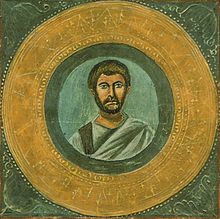Terence |
|---|
 Terence, 9th-century illustration, possibly copied from 3rd-century original |
| Born | Publius Terentius Afer
c. 195/185 BC |
|---|
| Died | c. 159? BC |
|---|
| Occupation | Playwright |
|---|
| Nationality | Roman African |
|---|
| Period | Roman Republic |
|---|
Publius Terentius Afer (fl. 166–160 BC), better known in English as Terence, was a Roman playwright. Terence was the author of six plays, all comedies based on Greek originals by Menander or Apollodorus of Carystus.
According to an ancient biography by Suetonius, Terence was born in Carthage and was brought to Rome as the slave of a senator named Terentius Lucanus, who educated and freed him. Suetonius reports that at about the age of 25, Terence travelled to Greece (or, according to another of Suetonius' sources, Asia Minor), and either died of illness in the east, or died by shipwreck on the return voyage. However, it is highly likely that the only information available to Suetonius about the life of Terence was speculation by earlier scholars who lived too long after Terence to obtain any reliable facts about his biography. Terence' origin as an African slave may have been an inference from his name Terentius Afer, which means "Terence the African," and the story of Terence' early death may have been invented to explain why he wrote so few plays.
Terence's six plays are:
- Andria (The Girl from Andros) (166 BC)
- Hecyra (The Mother-in-Law) (165 BC, but eventually performed in 160 BC)
- Heauton Timorumenos (The Self-Tormentor) (163 BC)
- Eunuchus (The Eunuch) (161 BC)
- Phormio (161 BC)
- Adelphoe (The Brothers) (160 BC)[1]
References